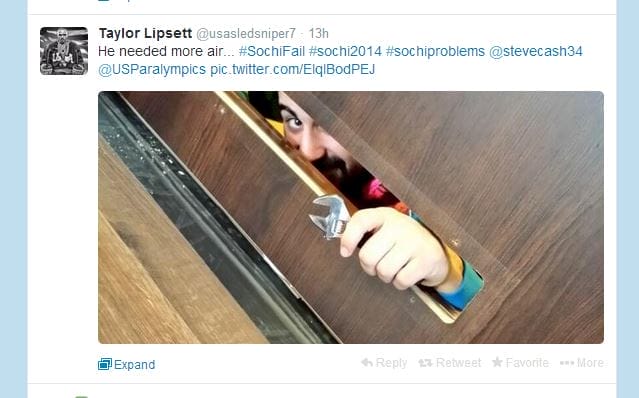First it was the yellow drinking water. Then it was U.S. bobsledder Johnny Quinn breaking down a door to free himself from his hotel bathroom. In another installment of what the Twittersphere named “#sochiproblems”, U.S. luger Kate Hansen released video of what she thought was a wolf roaming her hotel hallways. (More likely, it was a Siberian husky, but an intimidating and big creature nonetheless.)
From the moment it was announced that the 2014 Winter Olympics would be held in Sochi, U.S. writers and bloggers voiced their skepticism. Some scribes raised serious concerns, such as the human rights implications of Russian President Vladimir Putin’s anti-gay policies. Others were blither: a Washington Post story proclaimed that Russia wasn’t ready for the Olympics in part because the Olympic Flame kept going out.
These issues set up the perfect backdrop for the #sochiproblems phenomenon: Why focus on the impressive infrastructure needed to pull off even one Olympic event when a Canadian bobsledder is forced to take her Epsom salt bath in a trashcan? While far more things went right in Sochi than went wrong, much of the media continued to reinforce the idea that the city was not up to the task of hosting an international event of such scale.

Would you take an Epsom salt bath in a trashcan?
This is an important phenomenon for potential MBA candidates to note. While the admissions committee will be scanning your application for your qualifications, it will also be looking at your shortcomings just as much, if not more so. This isn’t because the admissions committee (adcomm) is made up of spiteful people, but rather because impressive applications are the norm, and they can only admit a sliver of applicants.
So how can you ensure they’ll focus on your great accomplishments and not the equivalent of your Sochi drinking water? First, you have to identify the potential weaknesses of your application and figure out the necessary steps to address them. Simply showing this self-awareness and taking concrete actions toward improvement can go a long way with the adcomm.
Here are a few of the biggest weaknesses we see in our clients’ profiles, and some of the ways candidates can begin addressing them:
Low GMAT score. If you bomb the test the first time, don’t just sign up for the next test and hope your luck will be better. Sign up for a test prep class or work with a tutor to ensure that you’re approaching the test methodically.
No quant experience. Did you skip statistics during undergrad or get a “C” in your calculus class? Take a college-level course that assigns letter grades to show that you’re boning up on your quantitative knowledge before entering B-school.
Little community involvement. If you don’t have a regular volunteering gig, find one that speaks to your passions and perhaps your career goals as soon as possible.
Lack of promotions at work. You have less control over this one, but you may be able to compensate by initiating a new project or starting a mentoring group for new colleagues to gain more leadership experience and add to your skill set.
Being part of an overrepresented candidate pool. Certain demographics and career backgrounds tend to dominate applications. So the adcomm isn’t just looking at you as an individual, but thinking about the overall makeup of the class. It’s essential to strategize regarding what differentiates you from your fellow consultants or engineers, and make sure that you highlight this in your application.
Just like Sochi ultimately won the Olympic perception battle this year, many less-than-perfect candidates still gain admittance into top MBA programs every year. Still, it’s important to address any shortcomings so that they don’t dominate the adcomm’s conversation.

























